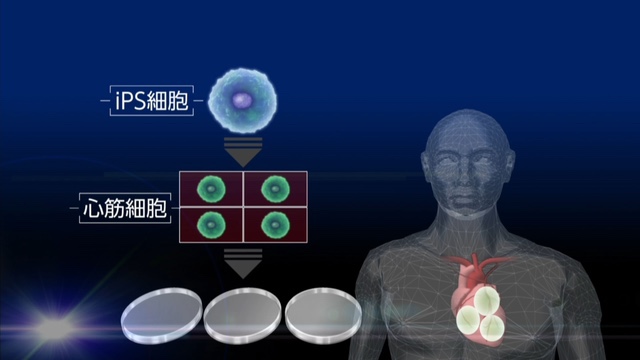
Juntendo University: Successful transplantation of iPS cardiomyocytes
– Transferring iPS myocardial sheets by Shinkansen –
Juntendo University:
September 12th
Following Osaka University, the Juntendo University team succeeded in performing a transplant operation on a patient.
Osaka University:
He has already successfully performed three iPS cardiomyocyte transplantation surgeries.
This time, it was verified that “transportation of myocardial sheets can be carried out at other institutions in remote areas.”
Surgery for ischemic cardiomyopathy:
mid-August,
I operated on a male patient in his 60s with severe heart failure, called “ischemic cardiomyopathy.”
Good postoperative course:
It is a disease in which the arteries of the heart become clogged, resulting in necrosis of the heart muscle and weakening of its ability to pump blood.
When it gets heavy, it dies.
He is doing well and will be discharged from the hospital soon.
(Sankei Shimbun)-Yahoo! News
https://news.yahoo.co.jp/articles/099d0740de888b49e9459e2339a134f9727ef211
Université Juntendo : Transplantation réussie de cardiomyocytes iPS
– Transfert de feuillets myocardiques iPS par Shinkansen –
Université Juntendo :
12 septembre
Après l’université d’Osaka, l’équipe de l’université Juntendo a réussi à réaliser une opération de greffe sur un patient.
Université d’Osaka :
Il a déjà réalisé avec succès trois chirurgies de transplantation de cardiomyocytes iPS.
Cette fois, il a été vérifié que “le transport des draps myocardiques peut être effectué dans d’autres établissements situés dans des régions éloignées”.
Chirurgie de la cardiomyopathie ischémique :
mi-août,
J’ai opéré un patient de sexe masculin dans la soixantaine souffrant d’insuffisance cardiaque sévère, appelée “cardiomyopathie ischémique”.
Bon cours postopératoire :
C’est une maladie dans laquelle les artères du cœur se bouchent, entraînant une nécrose du muscle cardiaque et un affaiblissement de sa capacité à pomper le sang.
Quand ça devient lourd, ça meurt.
Il va bien et sortira bientôt de l’hôpital.
(Sankei Shimbun) – Nouvelles de Yahoo!
Juntendo University: Erfolgreiche Transplantation von iPS-Kardiomyozyten
– Übertragung von iPS-Myokardblättern durch Shinkansen –
Juntendo-Universität:
12.09
Nach der Osaka University gelang es dem Team der Juntendo University, eine Transplantation an einem Patienten durchzuführen.
Universität Osaka:
Er hat bereits drei iPS-Kardiomyozytentransplantationen erfolgreich durchgeführt.
Diesmal wurde nachgewiesen, dass “der Transport von Myokardblättern auch in anderen Einrichtungen in abgelegenen Gebieten durchgeführt werden kann”.
Chirurgie bei ischämischer Kardiomyopathie:
mitte August,
Ich habe einen über 60-jährigen männlichen Patienten mit schwerer Herzinsuffizienz, genannt „ischämische Kardiomyopathie“, operiert.
Guter postoperativer Verlauf:
Es ist eine Krankheit, bei der die Arterien des Herzens verstopfen, was zu einer Nekrose des Herzmuskels und einer Schwächung seiner Fähigkeit, Blut zu pumpen, führt.
Wenn es schwer wird, stirbt es.
Ihm geht es gut und er wird bald aus dem Krankenhaus entlassen.
(Sankei Shimbun) – Yahoo!-Nachrichten
iPS-derived heart cell transplant conducted in Tokyo
A team of two universities in Japan
has conducted a clinical trial using a special type of stem cell to find new treatments for severe heart diseases.
Professor Tabata Minoru of Tokyo’s Juntendo University
Professor Sawa Yoshiki of Osaka University
told reporters on Monday that the team transplanted sheets of heart muscle cells into a patient with severe heart dysfunction.
The sheets were made from iPS cells,
which are created by reprogramming human body cells and can grow into various kinds of tissue.
The surgery was conducted at Juntendo University last month.
Team members say that
the patient in his 60s has made satisfactory progress and is expected to leave hospital soon.
Osaka University
had developed the sheets and conducted clinical trials on three patients,
but this is the first time a trial has been done elsewhere.
The sheets need to be kept at body temperature.
They were transported from Osaka to Tokyo in 3-and-a-half hours inside a sealed-tight container.
The professors say
they have confirmed the treatment can be provided at medical facilities that do not have the equipment to culture and process heart cell sheets.
The team plans to conduct transplants at more hospitals to verify the safety and efficacy of the treatment.
Team members say once established,
their treatment would be effective for gravely ill patients whose only hope for survival is a heart transplant.
Professor Sawa of Osaka University says
the latest trial is a big step forward, and he expects the treatment can develop further.
NHK WORLD-JAPAN News